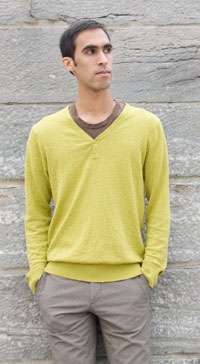Gabriel Dharmoo: Going Beyond by Lucie Renaud
/ October 1, 2011
Version française...
Flash version here.
 Premieres, film collaborations,
awards… this is a banner year for 30-year-old Gabriel Dharmoo. A few
short days after receiving the Robert Fleming Prize from the Canada Council
for the Arts, Dharmoo was awarded the 2011 Fernand Lindsay Composition
Prize by the Académie de musique du Québec at a gala celebrating the
100th anniversary of the Prix d’Europe; recipients of this
award are encouraged to further their education abroad. Premieres, film collaborations,
awards… this is a banner year for 30-year-old Gabriel Dharmoo. A few
short days after receiving the Robert Fleming Prize from the Canada Council
for the Arts, Dharmoo was awarded the 2011 Fernand Lindsay Composition
Prize by the Académie de musique du Québec at a gala celebrating the
100th anniversary of the Prix d’Europe; recipients of this
award are encouraged to further their education abroad.
As a result, Dharmoo
is flying to Chennai, India later this month. There, four masters of
Carnatic music will teach him theory, rhythm, singing and instrumental
technique; he will learn about their tradition through learning to interpret
their music.
“This is an unbelievably
rich musical culture,” he said during our interview. “The classical
and folk arts of India seem very foreign to our Western ears, but they
are at least as rich as our traditions. I like to confront radically
different realities and musical sensibilities. It is important to hear,
listen, experiment, understand and embrace musical traditions that are
based on the ear rather than on notation. I want to eat the music, to
digest it.”
Dharmoo wants to
extract features of Carnatic music, such as typical ornaments, and make
them part and parcel of his own music. Each element becomes part of
a musical language created from the mingling of different traditions.
“I prefer to create soundscapes that suggest things without pointing
to them specifically.”
This mode of selective
appropriation is also how he approaches the work of other composers,
whether they are classical masters or his avant-garde contemporaries.
Rather than trying to embrace all of a composer’s production, he will
seek out specific pages. When asked for the names of composers who inspire
him, he hesitates, then names Bach, Purcell (for the moods and characters
he creates), Bartók (the first 20th-century composer he
ever heard), Nono, Ligeti, and Xenakis. “I always wanted to be a musical
creator,” he says. “I used to be drawn to popular music, but I also
wanted to go further. I was inspired by Beck, Björk, and Portishead,
so I never wanted to become mainstream.”
After studying the
cello, he studied composition with Hugues Leclair and Éric Morin in
Quebec City, then with Serge Provost at the Montreal Conservatory. Bit
by bit, he explored and conquered. Five of his works were recognized
at SOCAN Young Composers Competitions: Vaai Irandu (2nd
prize in 2010), Le jour de mon mariage avec Dieu
(2nd prize in 2008), Chapelets (2nd prize
in 2008),
D’arts moults (3rd prize in 2006) and À l’Homme
(1st prize in 2002). His compositions have been played by
Arraymusic, Codes d’accès, Ensemble Chorum, Erreur de type 27, Motion
Ensemble and ECM +, and he was invited by the latter ensemble to take
part in Generation 2012. On September 11, 2010, the Aventa Ensemble
of Victoria performed his Sur les rives de
for flute, clarinet, percussion, violin and cello, and this month, Erreur
de type 27 will perform a piece of his for flute, tabla and percussion
at its Musica Masala concert.
He regularly works
with directors and choreographers. “I want to continue being active
on the arts scene; in other cities too, not just in Montreal,” he
says. He also wishes to pursue his training in other musical traditions,
thinks about teaching and will develop the improvisational side of his
art: “To me, composing and improvising are two hemispheres that join
up to become one huge ball.”
Dharmoo firmly believes
that the role of the composer needs to be redefined: “Composers
must go beyond writing notes. They must believe in their craft, have
a positive attitude, discuss with the concert-going public, give opinions
that are not based on perceptions only, remain open without compromising
themselves as artists.” Composers must renew themselves with each
work that is created, while being an integral part of the community:
“Composers are relevant to our society; their role is not necessarily
a pragmatic or practical one, but it is a vital one—especially in
its social dimension.”
Dharmoo feels that
contemporary music must review its relationship with the public; concerts
must be reorganized around specific themes and the work of young composers
should be promoted. “People’s perceptions are influenced by their
individual culture. Listeners can sometimes feel alienated, as they
might if they were at a kabuki performance. Composers need to rebuild,
piece after piece. Art forms must be justified by their context.”
Translation: Anne
Stevens
A piece by Gabriel
Dharmoo will be premiered on October 14 at the Café Babylone in Quebec
City, gabrieldharmoo.org, erreurdetype27.com
Version française... |
|


